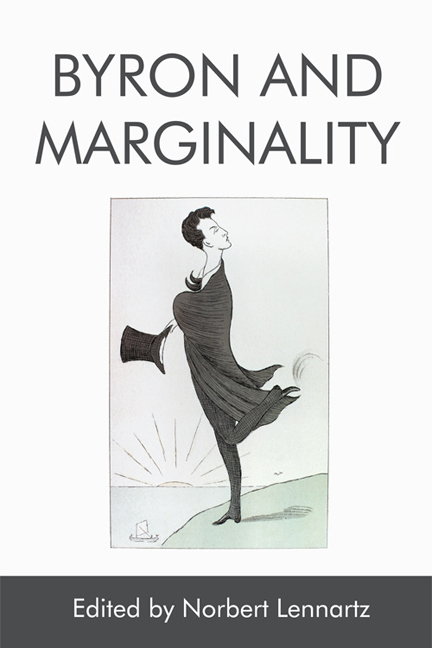Book contents
- Frontmatter
- Contents
- Foreword
- Acknowledgements
- Editions and Abbreviations
- 1 Lord Byron, Wandering and Wavering between the Centres and Margins of Romanticism: An Attempt at an Introduction
- I Byron’s Marginalisation in Romantic World Literature
- II Byron’s Marginal Identities and Places
- III Cherishing the Marginal – Marginal Genres in Byron
- IV On the Provocative Margins of Taste
- V Marginal Affairs – Visual and Paratextual Aspects in Byron
- List of Contributors
- Index
8 - ‘Like a Flash of Inspiration’: Byron’s Marginalised Lyricism in Hebrew Melodies
Published online by Cambridge University Press: 06 May 2021
- Frontmatter
- Contents
- Foreword
- Acknowledgements
- Editions and Abbreviations
- 1 Lord Byron, Wandering and Wavering between the Centres and Margins of Romanticism: An Attempt at an Introduction
- I Byron’s Marginalisation in Romantic World Literature
- II Byron’s Marginal Identities and Places
- III Cherishing the Marginal – Marginal Genres in Byron
- IV On the Provocative Margins of Taste
- V Marginal Affairs – Visual and Paratextual Aspects in Byron
- List of Contributors
- Index
Summary
Despite distinguished critical work, often of a contextual kind, in recent decades by critics such as Frederick Burwick and Paul Douglass, Kurt Heinzelman, Sheila A. Spector, Stuart Peterfreund, Toby Benis, Tom Mole, Jeremy Davies and others, Byron's Hebrew Melodies (1815) tend to be marginalised in accounts of his work. Two poems – ‘She Walks in Beauty’ and ‘The Destruction of Sennacherib’ – receive the dutiful homage exacted by their status as anthology pieces but, for the most part, the rest of the volume languishes in relative obscurity. There is an evident irony in this marginalisation, partly the result of the downgrading of Byron's lyrical verse in favour of his more ambitious longer poems and tales, since Hebrew Melodies is a volume that deals with the historical experience of the Jewish people, a race marginalised and worse in Western Christian culture. Byron is capable of anti- Semitic gibes at the expense of his musical associate, Isaac Nathan, or at least of ventriloquising such gibes: ‘why do you always twit me with his vile Ebrew nasalities’ (BLJ, vol. 4, p. 280), an insult made, one presumes, to placate his addressee, Thomas Moore, who felt Byron was treading on his patch in the volume. Yet he displays what Nathan describes as ‘a peculiar feeling of commiseration towards the Jews’. In this respect, Benis comments on the way in which biographers of the poet ‘have linked the poet's awareness of his own moral isolation from British society to his compassion for the idea of the Jews as a people in Diaspora, scattered across a hostile, Christian Europe’. Moreover, Nathan is clear that in the portraiture of the Jewish cause, Byron saw an image of ‘the truly distressed state of Ireland’.
Whether these perceptions result in appropriation of Jewish experience of an invalid or presumptuous kind is one critical issue that the poetry raises. Siding with the marginalised evidently risked transgression of orthodox Christian norms, as the response of some conservative contemporary reviewers reveals. Jeremy Davies, for example, quotes the reviewer for the British Review of August 1815 as remarking that ‘a young Lord is seldom the better for meddling with Jews’.
- Type
- Chapter
- Information
- Byron and Marginality , pp. 143 - 165Publisher: Edinburgh University PressPrint publication year: 2018



